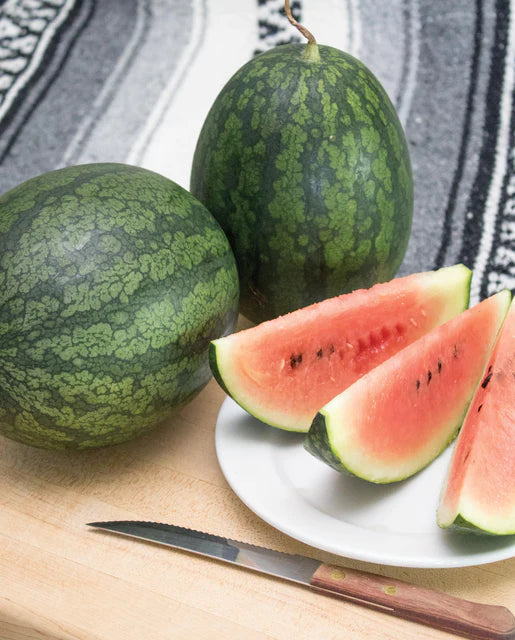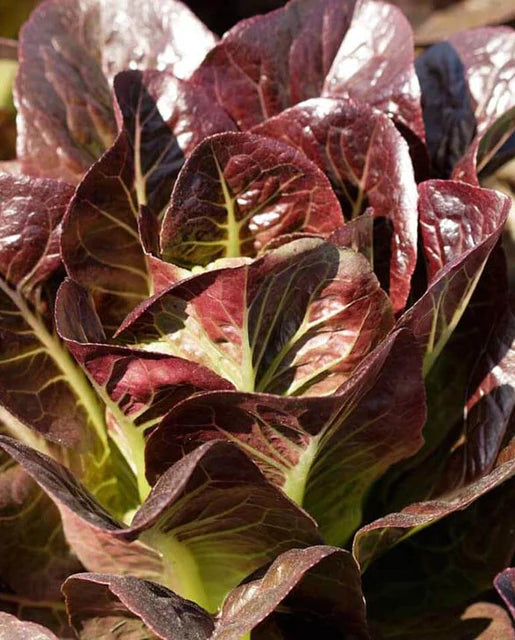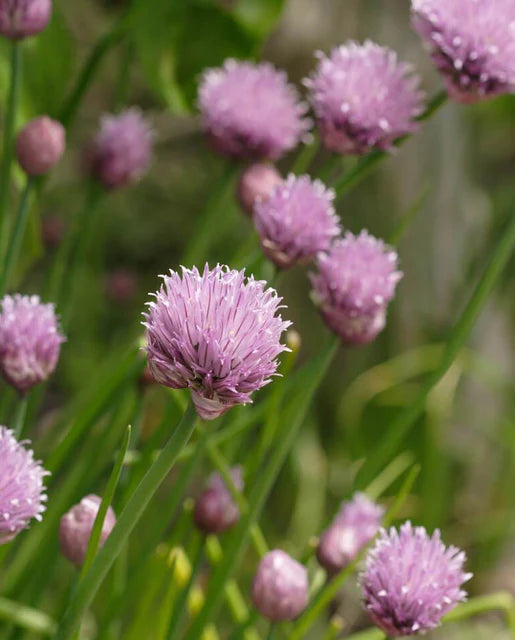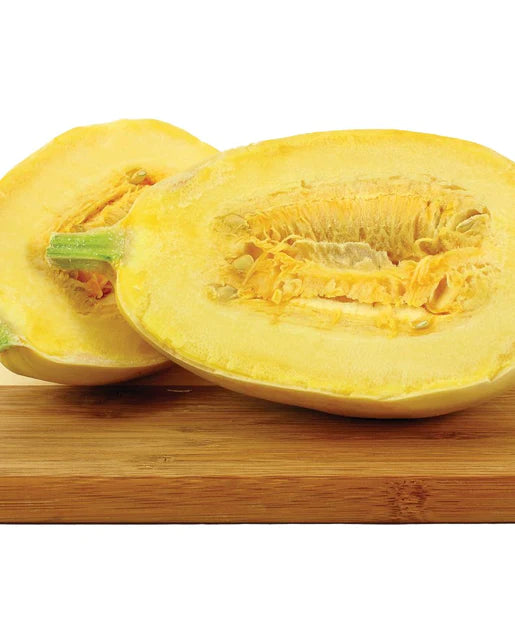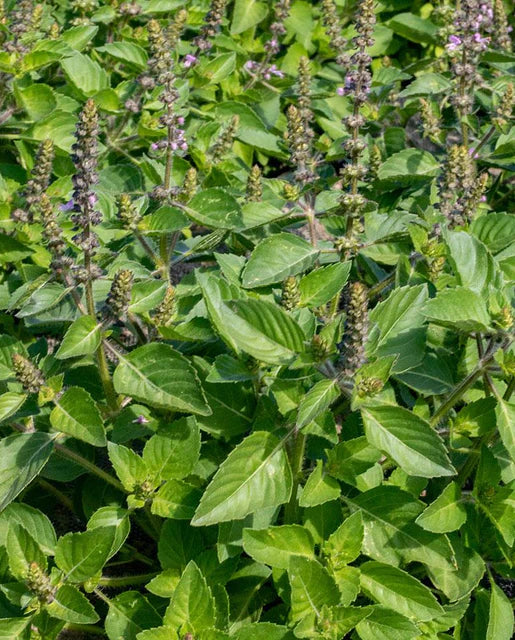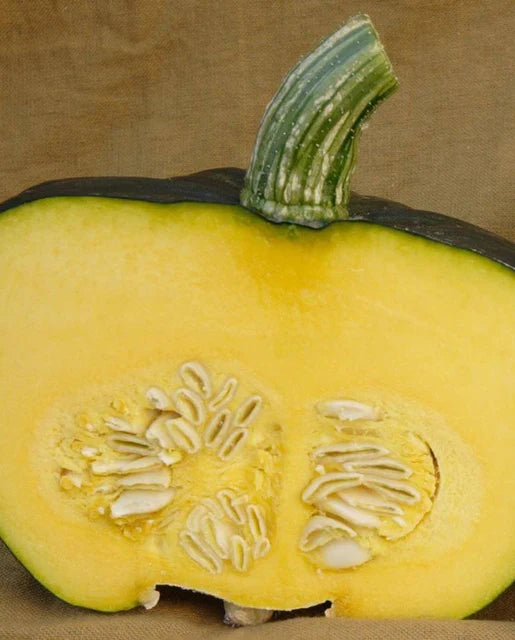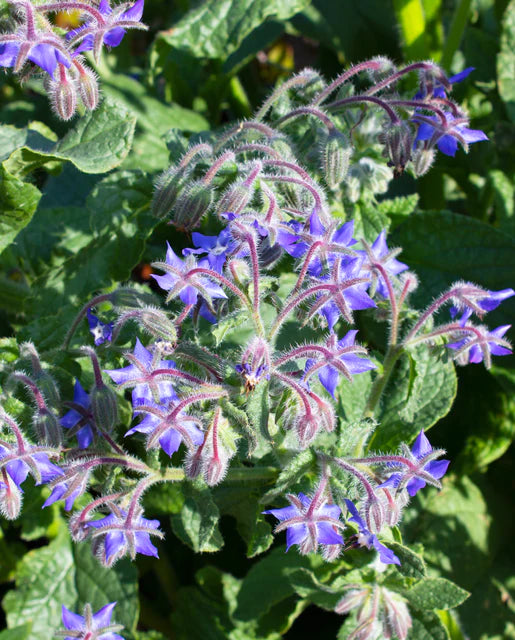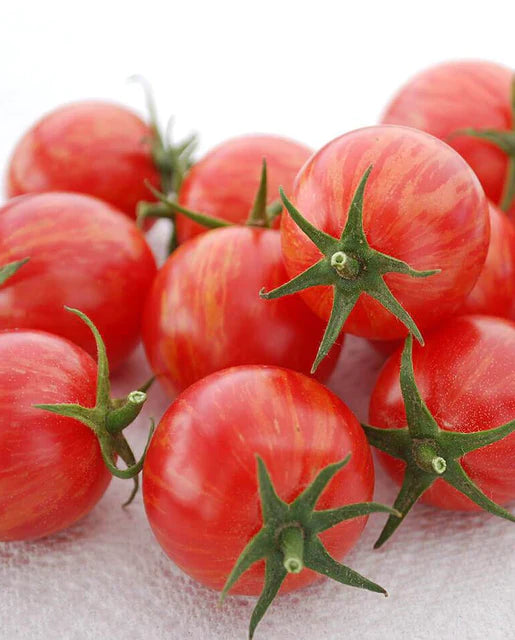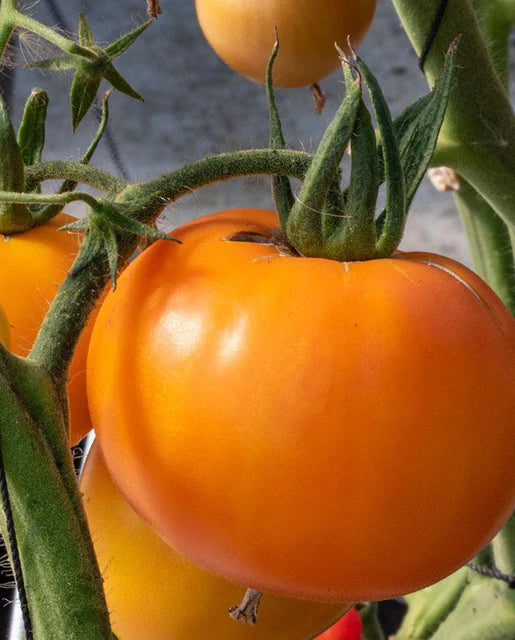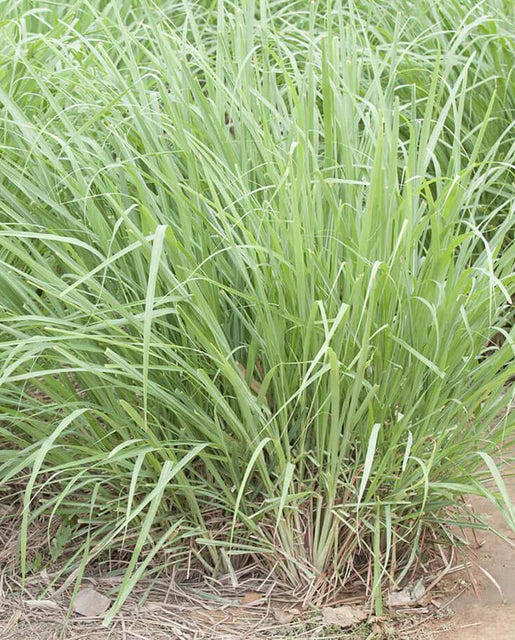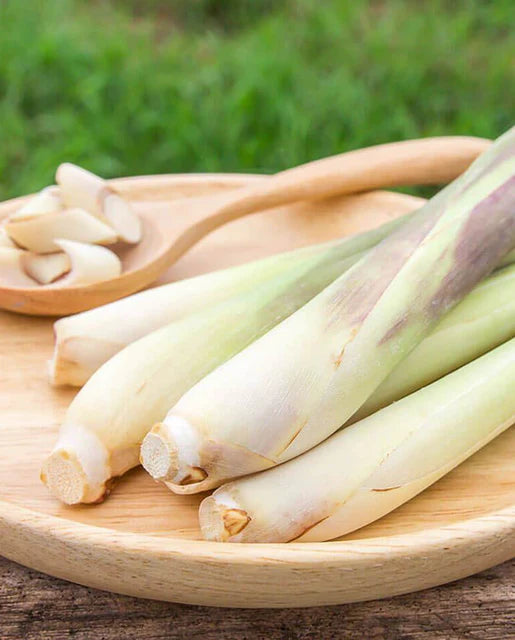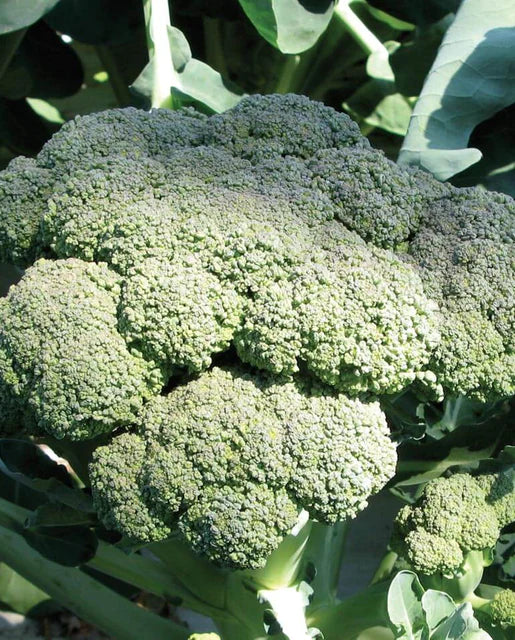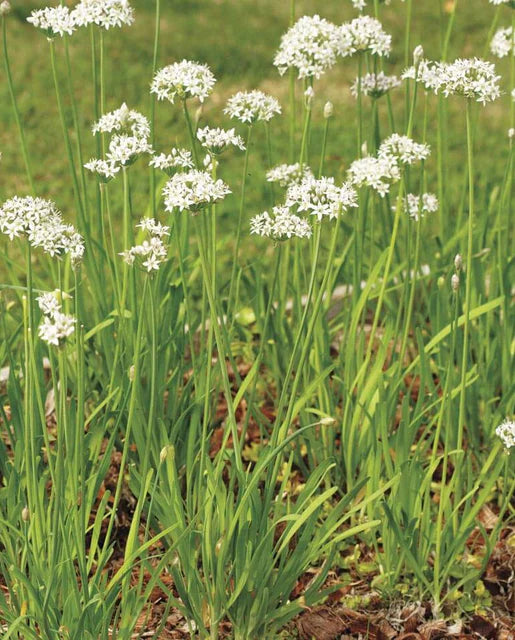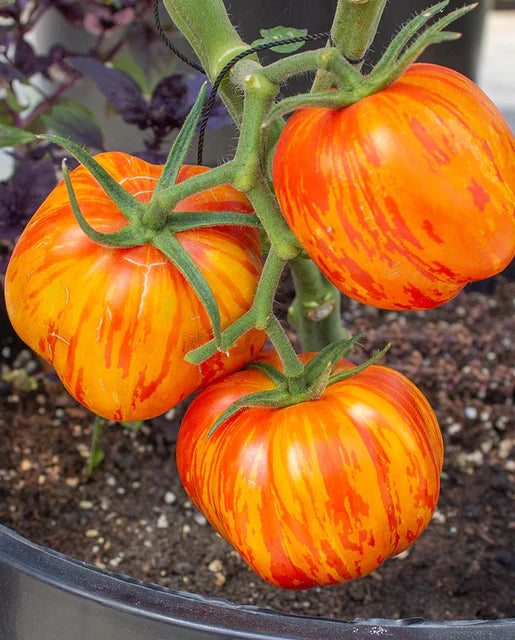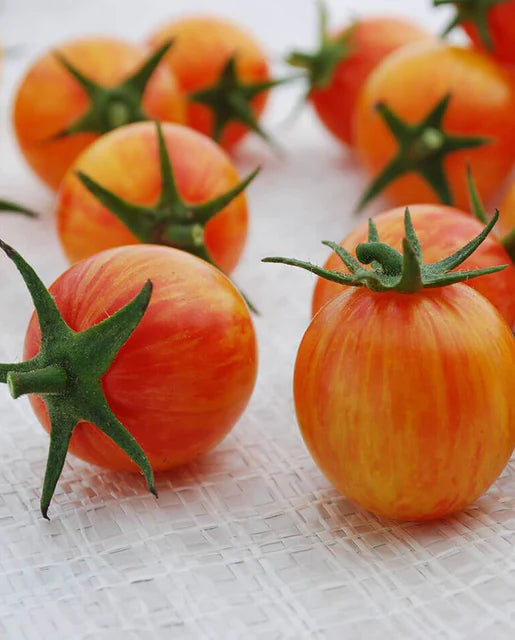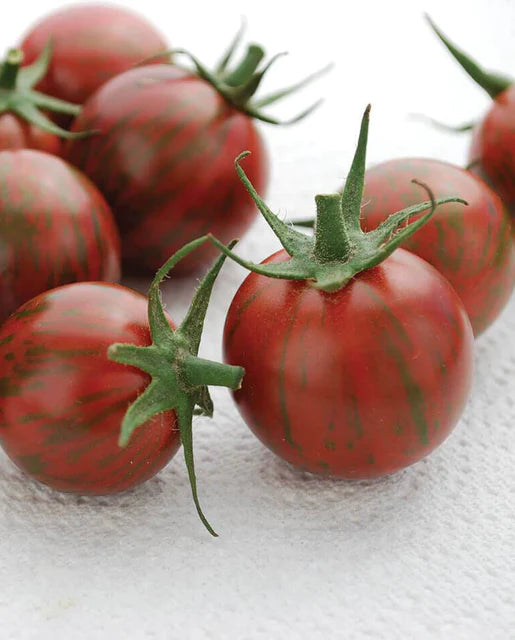121 products
121 products
Sort by:
West Coast Seeds
The ultimate in a red-skinned storage onion, this one stores nearly as well as Copra. Sow Redwing storage onion seeds early to accommodate for its long days to maturity. The large, globe shaped bulbs are hard bodied, and uniform at 7-10cm (3-4") across. They have unique, deep red, glossy skins, and strong tops.
At the end of summer, when the onions have formed nice bulbs, harvest them as needed. At full maturity, the tops of the onions will fall over, signalling the end of growth and the time to harvest. If no rain or frost in forecast, knock each onion over the rest of the way. This will break the roots’ contact with the soil and begin the drying process. Leave the onions like that for two or three days.
At the first sign of rain or frost, bring the whole onion plants indoors and lay them out in a dry area away from direct sunlight. Leave them to cure for two to four weeks until there is no more green showing in the stems, leaves, or necks. During this time, the papery skins covering each bulb will harden and contract. Use scissors to trim off the roots, and cut around 2cm (1″) up the stem for each bulb. Store them in a cool, dark place in mesh bags or trays with breathing holes. A well cured storage onion can retain its desirable flavour and aroma for as long as 12 months.
These seeds are coated with an inert, organically certified layer which helps to minimize clumping in storage and seed sowing machines. The coating is approved by organic certifiers in Canada, the US, EU, and Japan.
Matures in 110 days (Hybrid seeds)
Wonderful flavour in a personal sized watermelon. Crisp, juicy melons with dark, striped, firm skin over rich red flesh. Black Beauty Mini Watermelon seeds grow nice and compact plants with excellent flavour. Fruits grow 2 to 2.5kg (4-5.5 lbs). Picking watermelons from the vine, when they are at peak ripeness, is really amazing. The fruit is at its maximum sweetness, and the flavour is intense. This is not like store-bought melons at all. To check for maturity, watch the tendril nearest the stem that leads to the fruit. As soon as it withers, the fruit has reached its top ripeness.
Matures in 80 days. (Hybrid seeds)
Breen Pelleted Organic romaine lettuce seeds are CERTIFIED ORGANIC! Breen is a slow-growing miniature red romaine lettuce with an elegant, urn-shaped head. Its superb, rust coloured leaves have olive-green undertones and nicely contrasting veins. Breen is slow to bolt and looks lovely tucked in among green lettuces. The leaves are firm and crisp with excellent flavour. PELLETED SEEDS - sold by seed count. Pelleted seeds are great for precision sowing. The seed coating is certified organic and made from an inert clay mixture. Let Breen mature for harvest after most of your other lettuce has been already cut.
Recommended for hydroponic and aquaponic growing.
Matures in 45 days. (Open-pollinated seeds)
Easter Egg II radish seeds are a blend of six distinctly coloured radishes. The flesh is white and the roots can become relatively large without getting pithy. Look for white, rose pink, bubblegum pink, amethyst, mauve, scarlet and purple roots. The uniform roots are round, crisp, and flavourful, with tops that are good for bunching. Get the most out of your radish bed with this blend of diverse colours for spring and fall growing. Provide some frost protection, and you may be able to grow for winter harvests. Once radishes begin to bolt in response to warm soil in early summer, they should be pulled and composted. The process cannot be reversed, and a bolting radish is no good for eating.
Matures in 28 days. (Open-pollinated seeds)
Sow chive seeds at any time of year. Hardy, perennial, and easy to grow, the chopped stems and pink flowers add a fresh, mild green onion flavour to sandwiches, salads and baked potatoes. Clumps can be divided in spring or fall. If grown in containers, divide frequently enough to provide for constant lateral growth. Chives are surprisingly hardy and can be harvested all winter if given some protection from extreme cold. They are also quite drought tolerant, so they're good candidates for xeriscaping. The edible flowers are highly attractive to bumblebees, hoverflies, and other beneficial garden insects.
- Fresh, mild, green onion flavour
- Hardy and easy to grow
- Use stems and pink flowers
- Used dried flower stems in arrangements
- Excellent choice for the container herb garden
Sow 5mm-1cm (¼-½”) deep and keep moist until germination. If starting indoors, use bottom heat and plant 10-15 seeds per cell in a 72 cell plug tray. Transplant either into containers or into the garden once the soil has warmed up. Space clumps 15cm (6″) apart.
Tropaeolum majus. Tip Top Alaska mix Nasturtium seeds produce cream-on-green foliage with single yellow, orange, and deep red flowers, clustered in compact 30cm (12") mounds. Tip Top Alaska series will stay compact so they are perfectly suited to containers. Plant Tip Top Alaska mix Nasturtium seeds in hanging baskets, raised beds, or as companion plants in your organic vegetable garden. These compact Nasturtiums are very bushy, and do not form the long vines found in some other varieties. The foliage is extremely decorative, and the flowers, leaves, and seeds are all edible. Nasturtiums are drought resistant and suitable for xeriscaping.
Annual
- Hardy annual
- Yellow, orange, and deep red flowers
- Compact 30cm (12") mounds
- Cream on green foliage
- Single flowers cluster
C. pepo. Brilliant orange little spaghetti squash are stunning nestled in their tidy plants. These have higher beta-carotene than other spaghetti squash. About 1kg (2 lbs) each. Small Wonder spaghetti squash seeds produce heavy yields of fruits that store particularly well. Fruits average 15cm (6") long and 12cm (5") in diameter, so they are celebrated as personal size or single serving size spaghetti squash. Small Wonder performs well out in the field, but also in raised beds. You will get excellent germination from Small Wonder spaghetti squash seeds, and fast spring growth. We recommend interplanting sunflowers with your squash bed, to lure pollinators on site so that you get maximum fruit production from each plant.
Matures in 90 days. (Hybrid seeds)
CERTIFIED ORGANIC. Indigo Rose organic tomato seeds produce the most extraordinary, dark purple-skinned tomatoes currently available. The flavour of these tomatoes is clean and clear, reminiscent of plums, with a slightly acidic sweetness you'll only find in home-grown tomatoes. The so-called "saladette" style fruits average 50g (1.7 oz.).
Developed by Jim Myers at the Oregon State University using traditional plant breeding techniques, Indigo Rose Organic tomato seeds are the first improved tomato variety in the world that has the powerful antioxidant anthocyanin in the fruit. Indigo Rose organic tomatoes hang in clusters from vigorous sprawling vines with wild, curly leaves. Plants are hardy and have good disease resistance.
As the fruit matures the skin will become purple where exposed to light and the fruit tends to have a purple crown. This is caused by the antioxidant anthocyanin reacting to the sun. The fruits are ripe when they change from a shiny blue-purple to a dull purple-brown where they are exposed to the sun and green to red where there is no sun exposure. The fruit also softens when ripe.
Indeterminate (Vine)
Matures in 75 days (Open-pollinated seeds)
Lettuce Leaf basil seeds produce very large, bright, puckered green leaves with a glorious aroma. Provide high soil fertility and a light, well-dug soil to get the largest leaves. We recommend using potting soil with two tablespoons of Gaia All Purpose 4-4-4 per liter of soil. Try this mix in containers in your patio herb garden. Tear the big leaves into salad mixes or use whole leaves to wrap savory morsels like brochettes or salad rolls. Lettuce Leaf Basil is a sweet basil, with milder flavour than the Genovese types. It's perfect for the home gardener, but it also makes an eye catching and unique bundle for the market table.
Ocimum tenuiflorum. Holy Basil Organic seeds are CERTIFIED ORGANIC!. Holy Basil (medicinal basil) is frequently called Tulsi because it is widely used in Ayurvedic medicine. In Thailand, it is called Kaphrao, and used as a culinary herb. Holy basil is easy to grow from seeds, and it thrives in the heat of summer. Try growing certified organic Holy Basil in containers or in your herb garden. Note that this is a different species from the regular basil varieties shown in this website. It is highly fragrant, but does not have the same flavour profile as Genovese basil.
Green Dragon cucumber seeds produce vines with substantial fruits to 28cm (11") long. The fruits have linear indentations and tiny white spines that can easily be brushed off using a tea towel or similar cloth. Thin, dark green skins cover really tasty flesh that is burpless and never bitter. Green Dragon performs well both outdoors and in the greenhouse, but provide a trellis in either case so that the fruits can hang as they grow for better straightness. This variety is hybrid resistance to Cucumber Mosaic Virus (CMV), powdery mildew, downy mildew, and scab. For container growing, choose pots at least three to five gallons per plant, with fertile soil and good drainage.
Matures in 60 days. (Hybrid seeds)
- Gentle and sweet
- Never bitter, burpless
- Shiny, smooth, green skin
- Hybrid seeds
- Matures in 60 days
C. pepo. These beautifully shaped, bright orange pumpkins have strong, dark green handles and make perfect Jack-O-Lanterns. Plant Neon pumpkin seeds for productive, semi-bush plants that take up less space in the garden or field, and produces higher yields per acre if grown commercially. The uniform fruits average 3kg (7-8 lbs). If grown in a cool summer, fruit may be faintly bi-coloured when immature. By harvest time they become the normal golden colour as shown. Pumpkins thrive in any region with hot summers.
Matures in 70 days. (Hybrid seeds)
- Bright orange with strong handles
- Fruits average 3kg (7-8 lbs)
- Makes perfect jack-o-lanterns
- Hybrid seeds
- Matures in 70 days from transplant
Dukat dill seeds produce dill with a particularly fine bouquet and flavour. The darker-than-usual leaves are excellent fresh or dried. Dukat has exceptionally large seed heads. Dukat is the variety to grow for homemade dill pickles, and can be grown in a large container in full sun. This dill stays relatively short at 45-60cm (18-24").
The structure of dill's flowers is known as an umbel. Thus dill is considered an umbelliferous plant. Other umbellifers include carrots, cilantro, fennel, parsnips, and Ammi. All of these plants are attractive to predatory insects such as lady beetles, Syrphid flies (hover-flies), lacewings, and tiny parasitoid wasps. West Coast Seeds encourages organic gardeners to grow dill precisely to attract these beneficial insects, for they will control pest insects like aphids, thrips, whitefly, and the caterpillar of the Small White Butterfly (cabbage moth).
- Grow this variety for homemade dill pickles
- Fine bouquet and flavour
- Exceptionally large seed heads
- Excellent fresh or dried
- Grow in large container in full sun
Dill seeds need some light to germinate. Sow seeds no more than 5mm (¼”) deep in rows 45cm (18″) apart. Thin the plants to stand at least 15cm (6″) apart.
C. maxima. Burgess Buttercup squash seeds were first introduced by the Burgess Seed Company in Illinois in 1932. Since then, this reliable heirloom has been producing small, 1.5kg (3 lb) turban shaped fruits with dark green skins and the unmistakable navel or dome at the blossom end. The golden orange flesh inside each fruit is sweet and finely textured, never watery. The thin skins are extremely hard, but that is key for long term storage. These popular squashes won't last right through winter the way a hubbard or delicata might, but you should bring one to Christmas dinner, and impress your friends and family.
Matures in 115 days. (Open-pollinated seeds)
Large, fuzzy, cucumber-scented leaves and vivid blue flowers attract bees all summer long. Usually grown for the bees and flowers, young leaves can be cooked like spinach or used in salads. Also known as the star flower because of the arrangement of its petals, the flowers have a light cucumber flavour and will stun with their vivid blue petals. A dramatic use is to make ice cubes with the petals frozen into them and drop into cold drinks. Borage seeds contain oils with the highest concentration (20% to 30%) of the fatty acid GLA, even higher than Evening Primrose. Altogether a versatile, attractive and useful herb, add starry blue flowers to salads, drinks, berry desserts for visual appeal. Borage may self sow. It is attractive to bumblebees that must buzz at a certain resonance to release a jet of pollen.
- Large, fuzzy leaves
- Vivid blue, edible flowers
- Versatile, attractive, useful
- Deer resistant
- Mild cucumber flavour
Sow seeds 1cm (½”) deep, and thin to 60cm (24″) apart. Borage will get large and fill in spaces between plants
Pink Bumble Bee Organic tomato seeds are CERTIFIED ORGANIC! Gorgeous pink cherry tomatoes streaked with yellow, hang in trusses on tall, productive plants. Chefs will enjoy their stunning visual appeal and sweet flavour. This is a great bet for market growers and home gardeners alike. Pink Bumble Bee resists cracking. This variety will work in a five gallon (or larger) container, but be sure to provide trellis support, as it forms a vigorous vine. Keep the fruits picked, and the plants will continue producing until late summer.
Indeterminate (vine). Matures in 70 days. (Open-pollinated seeds)
CERTIFIED ORGANIC! Old German Organic tomato seeds produce huge fruit striped with red and gold colours reminiscent of a Caribbean sunset. This fruit is sweet and delicious Old German make great slicing tomatoes that will compliment any meal with a gorgeous splash of colour.
This variety originates from a Mennonite community in the Shennandoah Valley of Virginia circa the mid 1800's. The Mennonites take great pride in preserving their heritage, faith, and way of life. They are responsible for cultivating many excellent heirloom vegetable varieties. The seeds came into commercial production in 1985.
The hearty plants with potato leaves often grow to 2.4-3m (8-10') tall. Plants produce moderate yields of 900g (2 lb.) fragrant, decorative and nearly seedless tomatoes. Sturdy staking is required to support the large vines and heavy fruit. It's important to note this variety is not drought tolerant.
Indeterminate (vine)
Matures in 80 days (Open-pollinated seeds)
- Deliciously sweet and mild
- Red/gold colours of sunset
- Certified organic
- Open pollinated seeds
- Matures in 80 days
Cymbopogon flexuosus. Lemongrass is a tropical plant from the grass family (Poaceae) that will grow well in temperate regions if given the right conditions. Sow Lemongrass seeds indoors in late winter using bottom heat or a seedling heat mat. Maintain moist conditions and a temperature around 21°C (70°F), and the seeds will germinate in 5 to 21 days. Be sure to use sterilized seed starting mix, and either a clear dome over your seedling tray, or sealed into a plastic bag to maintain moisture. Transplant outdoors or into containers in full sun once the weather has warmed up in early summer. At the end of summer move container plants into a frost free environment with good air circulation. Reduce watering to almost none, making the soil barely moist once a week.
When using Lemongrass in the kitchen, remove any loose, outer layers. Either use whole pieces, crushed slightly with a pestle or under the back of your cleaver, or slice sections very thinly in cross section. This will help break up the strong fibres of the grass stalks.
Tender Perennial
- Excels in greenhouses
- Makes a great container plant
- Aromatic and productive
- Treat as a tender perennial
- Open pollinated
Centaurea cyanus. A mix of purple, blue, pink, and white papery blossoms bring summer colour to the garden. Try planting some Tall Mixed Cornflowers in a big clump at the edge of the yard for stunning summer colour. They are an excellent cut flower and they dry well, looking fresh for ages. Cornflowers are highly attractive to pollinators and beneficial insects like Syrphid flies. The flowers are edible, and the plants are drought resistant for xeriscaping. Deadhead spent flowers to prolong the bloom period, and to keep plants looking tidy. Tall Mixed Cornflowers seeds are easy to save from year to year.
Annual
CERTIFIED ORGANIC! Dark green plants grow 45-75cm (18-30") tall with a variable bluish green central head between 8-20cm (3-8") across. This is followed by abundant side shoots that keep coming until frost. Sow Calabrese organic broccoli seeds in early March indoors, or in May and June for a fall harvest. This heirloom broccoli variety arrived in North America with Italian immigrants in the late 1880s. It is probably centuries old. What Calabrese lacks in terms of uniformity, it more than makes up for in rich flavour.
Matures in 60 days. (Open-pollinated seeds)
- Great flavour and texture
- Dark green 10cm (4" heads)
Sow indoors, 3 or 4 seeds per pot, 5mm (¼”) deep, under very bright light. Thin to the strongest plant. Space transplants 45-60cm (18-24″) apart in rows 75-90cm (30-36″) apart.
Kolibri kohlrabi seeds produce surprisingly uniform bulbous stems with bright purple, extremely smooth skins over succulent and crisp white flesh. This variety can become quite large without losing any of its appealing texture. The purple colour of Kolibri is so appealing that they really stand out in the garden. Kohlrabi has the attractive texture of a crisp apple with a mild Brassica flavour that hints of cabbage. Its crispness lends it well for use in salads with thick dressings. Shredded, it makes a delicious coleslaw. And like its Brassica cousins, kohlrabi is an excellent source of phosphorus and potassium as well as dietary fibre, and (somewhat surprisingly) vitamin C. Winner of the RHS Award of Garden Merit.
Matures in 55 days. (Hybrid seeds)
- Crisp white interior
- Smooth purple skin
- Good for snacks and salads
- Hybrid seeds
- Matures in 55 days
C. pepo. Eight Ball is a novel, round zucchini with dark green skin and some yellow speckling, borne on an easy-to-pick, bushy plant that only grows to about 1m (3') wide. Eight Ball zucchini seeds are an All America Selections Winner with great productivity, uniformity, and flavour. Harvest only a day or so after pollination for tender, exotic looking, spherical zucchinis with just the right tender texture and mild taste. Eight Ball is a good candidate for large containers or raised beds, and will produce lots of fruits over several weeks if plants are regularly picked. Provide fertile soil, and use a balanced organic fertilizer at transplant time.
Matures in 40 days. (Hybrid seeds)
A. tuberosum. This flat-leaf variety of Garlic Chives seeds has a strong garlic flavour and aroma. The white flowers and stalks are used (only a small amount is needed), to add the pungent taste of garlic to salads, vegetables, dumplings, and stir-fries. Popular in Asian cuisine, garlic chives are also known as ku chai in Chinese. While the leaves and flower stems are delicious and useful in the kitchen garlic chives are also very attractive flowering plants. Use this herb as companion plants to repel aphids from flowers or vegetables prone to attack.
- Strong garlic flavour and aroma
- Powerful flavour
- Popular in Asian cuisine
- Flat-leaf variety
- Add to salads, dumplings and stir-fries
Tagetes erecta. These vigorous, very upright marigolds feature large, deeply orange flowers with highly ruffled petals. Kees' Orange marigold grows to 60-70cm (24-28") tall, and works well in containers or in the vegetable garden where it makes a generalist companion plant for pretty much all crops. It attracts beneficial insects and repels pests. It is great as a long-lasting cut flower, and looks amazing planted in large groups. Space them carefully to allow for good air circulation.
Annual
CERTIFIED ORGANIC! Large, substantial fruits grow in clusters of three to four on sturdy, relatively short vines. Get Stuffed Organic features blocky, striped fruits that are almost the shape of a bell pepper. They can be hollowed and stuffed for cooking, or used raw as a delicious, edible serving vessel. They were a big hit in our tomato trials and are worth growing for their beautiful appearance alone.
Indeterminate (vine)
Matures in 75days (Open-pollinated seeds)
Sunrise Bumble Bee Organic tomato seeds are CERTIFIED ORGANIC! Along with Pink and Purple Bumble Bee tomatoes, Sunrise has orange skins that are streaked with bright gold. They are strikingly beautiful, but also boast tremendous sweet flavour. The texture is succulent and the small cherry fruits are resistant to cracking. The Bumble Bee series will work in a 5 gallon (or larger) container, but be sure to keep the vines well picked so they keep producing right through late summer. And provide strong support for the vigorous plants to lean on.
Indeterminate (vine) Matures in 70 days. (Open-pollinated seeds)
Purple Bumble Bee Organic tomato seeds are CERTIFIED ORGANIC! Super cute cherry tomatoes with red skins and purple stripes. The sweet round fruits have excellent flavour and grow to a uniform 4cm (1.5") across. They hang in long trusses from tall indeterminate vines. Try Purple Bumble Bee in a 5 gallon (or larger) container, but be sure to provide the support of a trellis or string, as the vines are vigorous. Keep the plants picked and snip back any suckers so the fruit production is limited to one central vine.
Indeterminate (vine) Matures in 70 days. (Open-pollinated seeds)
Red Russian Kale Seeds grow leaves that are flat, toothed, grey-green leaves with purple stems and veins really brighten after frosts. Tender for salads and good for bunching, the red and purple hues turn a rich, dark green colour when cooked. It may be richer in vitamins and minerals than other greens and is very disease resistant. This old time heirloom kale eventually goes to seed, producing tall towers of yellow flowers followed by edible seed pods. Seed saving is easy with kale, but don't let the plant drop its seed in your garden, or there will be kale in your future for years to come.
Matures in 50 days. (Open pollinated seeds)
SUMMER HARVEST. Copenhagen Market cabbage seeds are a Danish heirloom introduced by H. Hartman & Co. in 1909. This early variety forms round, solid heads 15-20cm (6-8") in diameter, making it the largest early round-head cabbage for summer harvest. This summer harvest variety has good keeping ability, excellent uniformity, and rich flavour. This variety is outstanding for coleslaw. It's a popular market variety that has the added benefit of shipping very well. Protect your cabbage row from the caterpillar of the cabbage moth by draping lightweight row cover over the plants.
Matures in 63 to 100 days. (Open-pollinated seeds)
When learning how to grow cabbage, sow 3 or 4 seeds per pot, 5mm (¼”) deep, under very bright light. Thin to the strongest plant. Space transplants 45-60cm (18-24″) apart in rows 60-90cm (24-36″) apart.
Purple Mist Organic Pea Seeds produce a productive Dutch heirloom that really is a multi-purpose pea. The young pods can be enjoyed as snow peas. The pods can be left to develop their unusual purple colour for mid-season shelling peas. Once the peas inside each pod have fully matured, they can be shelled and dried and used for soup peas all winter long. The 1.5-2m (5-6') tall vines should be trellised and enjoyed as a striking ornamental, too. Purple Mist organic pea seeds are not enation-resistant.
Matures in 80-85 days. (Open-pollinated seeds)


